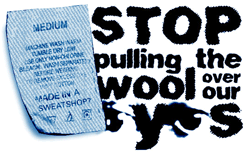WELCOME TO THE ARCHIVE (1994-2014) OF THE MAQUILA SOLIDARITY NETWORK. For current information on our ongoing work on the living wage, women's labour rights, freedom of association, corporate accountability and Bangladesh fire and safety, please visit our new website, launched in October, 2015: www.maquilasolidarity.org
 Currently, there is no way for consumers, including public institutions, to know where the apparel products they buy are made or under what conditions - clothing labels only tell us the country of origin. Because we often cannot link a retailer to the factories that makes their clothes, the retailer cannot be held responsible for the conditions under which their goods are made.
Currently, there is no way for consumers, including public institutions, to know where the apparel products they buy are made or under what conditions - clothing labels only tell us the country of origin. Because we often cannot link a retailer to the factories that makes their clothes, the retailer cannot be held responsible for the conditions under which their goods are made.
In January 2001, the Ethical Trading Action Group (ETAG) first proposed minor changes to the federal government's textile labelling regulations requiring companies to disclose manufacturing locations in a publicly accessible database. The effect would be far-reaching: in order to sell clothes in Canada companies would have to provide the public with the names and addresses of all production sites used in manufacturing their clothing. Public disclosure of factory locations would remove the veil of secrecy that currently protects the industry from public scrutiny, and make it possible to verify whether company reports on working conditions and labour practices are accurate.
Public disclosure of factory locations and annual progress reports on efforts to achieve compliance with international labour standards also encourage companies to pay closer attention to working conditions in their supply chains, and allows companies that use the same factories to work together to improve conditions.
The Government of Canada formally rejected ETAG's proposal in July, 2005.
A number of apparel brands including Nike, Levi Strauss, Puma and Timberland have since voluntarily disclosed factory locations. Lists of their factory locations are available here.
Finally some major brand-name apparel and footwear companies are responding to the call for greater transparency and accountability
The Conference Board of Canada's response to ETAG's disclosure proposal largely dismisses the proposal. Unfortunately the report demonstrates a lack of understanding of that proposal or its objectives, a lack of concrete alternatives, and a disturbing bias against union representation.
On July 10, 2008, following the Ethical Trading Forum in Vancouver at which transparency and Olympic licensing was debated with companies, trade unions, NGOs and Olympic organizers, Nike publicly released the full list of factories that produced its products for the Beijing 2008 Olympics.
The Ethical Trading Action Group's proposal for factory disclosure regulations gets the cold shoulder from Canada's Industry Minister.
Representatives of the Ethical Trading Action Group (ETAG) delivered tens of thousands of clothing labels and petitions signed by over 20,000 Canadians to the office of Industry Minister Allan Rock.